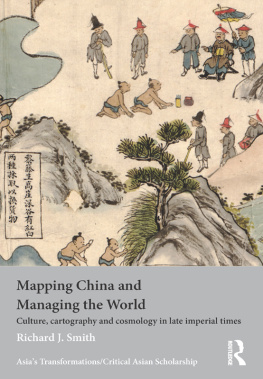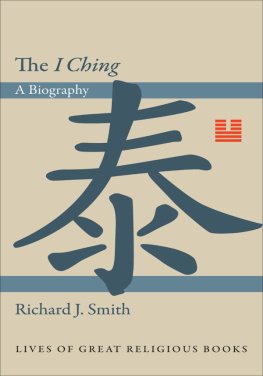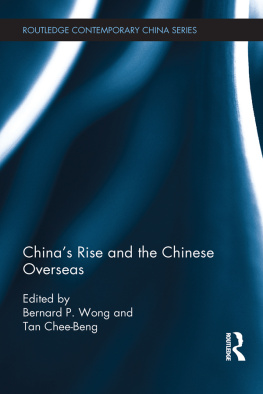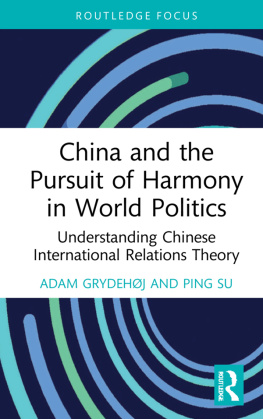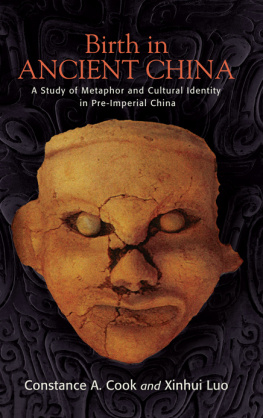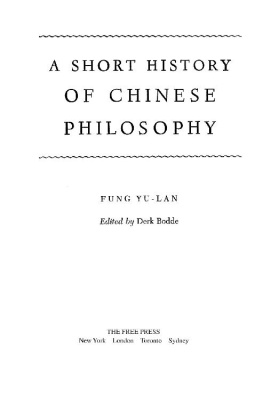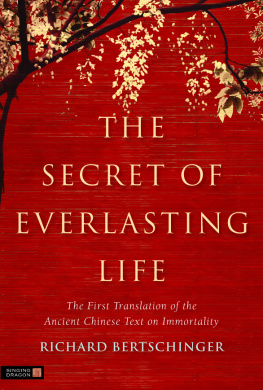Mapping China and
Managing the World
From the founding of the Qin dynasty in 221 BCE to the present, the Chinese have been preoccupied with the concept of order (zhi). This cultural preoccupation has found expression not only in China's highly refined bureaucratic institutions and methods of social and economic organization but also in Chinese philosophy, religious and secular ritual, and a number of comprehensive systems for classifying every form of human achievement, as well as all natural and supernatural phenomena. Richard J. Smith's Mapping China and Managing the World focuses on several crucial devices employed by the Chinese for understanding and ordering their vast and variegated world, which they saw as encompassing all under Heaven.
The book begins with discussions of how the ancient work known as the Yijing (Classic of Changes) and maps of the world became two prominent means by which the Chinese in imperial times (221 BCE to 1912) managed space and time. Smith goes on to show how ritual (li) served as a powerful tool for overcoming disorder, structuring Chinese society, and maintaining dynastic legitimacy. He then develops the idea that just as the Chinese classics and histories ordered the past, and ritual ordered the present, so divination ordered the future.The book concludes by emphasizing the enduring relevance of the Yijing in Chinese intellectual and cultural life as well as its place in the history of Sino-foreign interactions.
This selection of essays by one of the foremost scholars of Chinese intellectual and cultural history will be welcomed by Chinese and East Asian historians, as well as those interested more broadly in the cultures of, and interactions between, China and East Asia.
Richard J. Smith is George and Nancy Rupp Professor of Humanities and Professor of History at Rice University, Houston, Texas.
Asia's Transformations
Edited by Mark Selden, Cornell University, USA
The books in this series explore the political, social, economic and cultural consequences of Asia's transformations in the twentieth and twenty-first centuries. The series emphasizes the tumultuous interplay of local, national, regional and global forces as Asia bids to become the hub of the world economy. While focusing on the contemporary, it also looks back to analyse the antecedents of Asia's contested rise.
This series comprises several strands:
Asia's Transformations
Titles include:
Debating Human Rights
Critical essays from the United States and Asia
Edited by Peter Van Ness
Hong Kong's History
State and society under colonial rule
Edited by Tak-Wing Ngo
Japan's Comfort Women
Sexual slavery and prostitution during World War II and the US occupation
Yuki Tanaka
Opium, Empire and the Global Political Economy
Carl A.Trocki
Chinese Society
Change, conflict and resistance
Edited by Elizabeth J. Perry and Mark Selden
Mao's Children in the New China
Voices from the Red Guard generation
Yarong Jiang and David Ashley
Remaking the Chinese State
Strategies, society and security
Edited by Chien-min Chao and Bruce J. Dickson
Korean Society
Civil society, democracy and the state
Edited by Charles K. Armstrong
The Making of Modern Korea
Adrian Buzo
The Resurgence of East Asia
500, 150 and 50 year perspectives
Edited by Giovanni Arrighi, Takeshi
Hamashita and Mark Selden
Chinese Society, second edition
Change, conflict and resistance
Edited by Elizabeth J. Perry and Mark Selden
Ethnicity in Asia
Edited by Colin Mackerras
The Battle for Asia
From decolonization to globalization
Mark T. Berger
State and Society in 21st Century China
Edited by Peter Hays Gries and Stanley Rosen
Japan's Quiet Transformation
Social change and civil society in the 21st century
Jeff Kingston
Confronting the Bush Doctrine
Critical views from the Asia-Pacific
Edited by Mel Gurtov and Peter Van Ness
China in War and Revolution, 18951949
Peter Zarrow
The Future of US-Korean Relations
The imbalance of power
Edited by John Feffer
Working in China
Ethnographies of labor and workplace transformations
Edited by Ching Kwan Lee
Korean Society, second edition
Civil society, democracy and the state
Edited by Charles K. Armstrong
Singapore
The state and the culture of excess
Souchou Yao
Pan-Asianism in Modern Japanese History
Colonialism, regionalism and borders
Edited by Sven Saaler and J. Victor Koschmann
The Making of Modern Korea, second edition
Adrian Buzo
Re-writing Culture in Taiwan
Edited by Fang-long Shih, Stuart Thompson, and Paul-Franois Tremlett
Reclaiming Chinese Society
The new social activism
Edited by You-tien Hsing and Ching Kwan Lee
Girl Reading Girl in Japan
Edited by Tomoko Aoyama and Barbara Hartley
Chinese Politics
State, society and the market
Edited by Peter Hays Gries and Stanley Rosen
Chinese Society, third edition
Change, conflict and resistance
Edited by Elizabeth J. Perry and Mark Selden
Mapping Modernity in Shanghai
Space, gender, and visual culture in the Sojourners' City, 185398
Samuel Y. Liang
Minorities and Multiculturalism in Japanese Education
An interactive perspective
Edited by Ryoko Tsuneyoshi, Kaori H. Okano and Sarane Boocock
Japan's Wartime Medical Atrocities
Comparative inquiries in science, history, and ethics
Edited by Jing-Bao Nie, Nanyan Guo, Mark Selden and Arthur Kleinman
State and Society in Modern Rangoon
Donald M. Seekins
Learning Chinese, Turning Chinese
Becoming sinophone in a globalised world
Edward McDonald
Aesthetic Constructions of Korean Nationalism
Spectacle, politics and history
Hong Kal
Popular Culture and the State in East and Southeast Asia
Edited by Nissim Otmazgin and Eyal Ben Ari
Japan's Outcaste Abolition
The struggle for national inclusion and the making of the modern state
Noah Y. McCormack
The Market and Temple Fairs of Rural China
Red fire
Gene Cooper
The Role of American NGOs in China's Modernization
Invited influence
Norton Wheeler
State, Society and the Market in Contemporary Vietnam
Property, power and values
Hue-Tam Ho Tai and Mark Sidel
Asia's Great Cities
Each volume aims to capture the heartbeat of the contemporary city from multiple perspectives emblematic of the authors own deep familiarity with the distinctive faces of the city, its history, society, culture, politics and economics, and its evolving position in national, regional and global frameworks. While most volumes emphasize urban developments since the Second World War, some pay close attention to the legacy of the longue dure in shaping the contemporary. Thematic and comparative volumes address such themes as urbanization, economic and financial linkages, architecture and space, wealth and power, gendered relationships, planning and anarchy, and ethnographies in national and regional perspective. Titles include:

